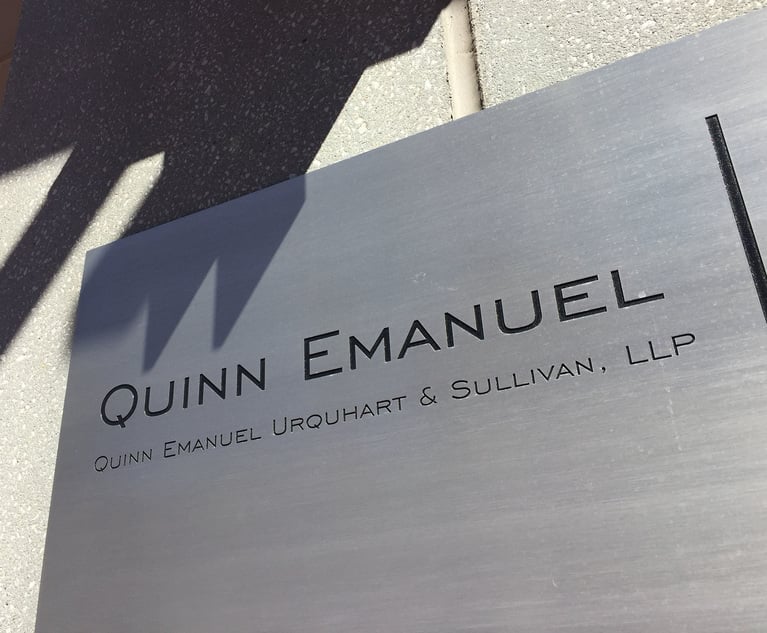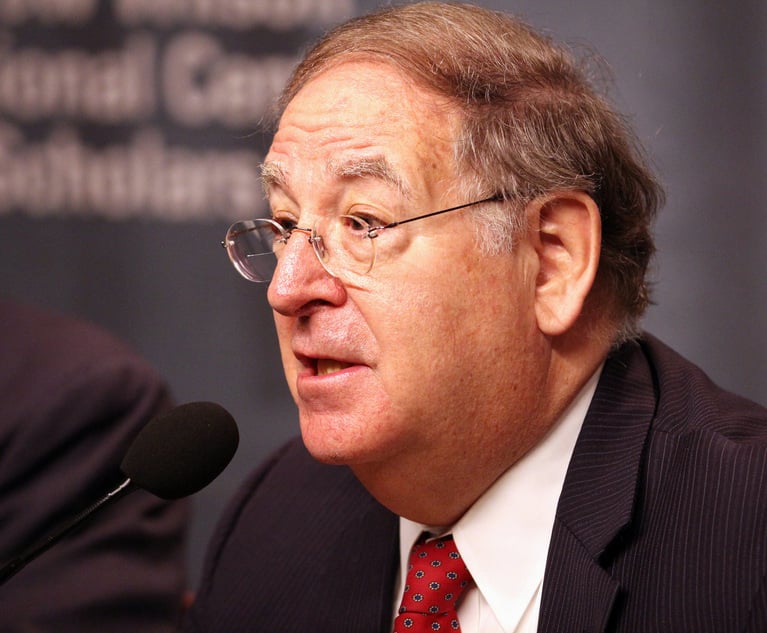MDL Sought for Bitcoin Cases Dismissed Under SCOTUS Decision
Plaintiffs firm Edelson PC has asked a federal judicial panel to consolidate class actions brought over the 2014 collapse of the bitcoin exchange Mt. Gox after a federal judge last year dismantled its case under the U.S. Supreme Court's decision in Bristol-Myers Squibb v. Superior Court of California.
March 01, 2018 at 06:41 PM
5 minute read
 Credit: Wit Olszewski/Shutterstock.com
Credit: Wit Olszewski/Shutterstock.com Plaintiffs firm Edelson PC has asked a federal judicial panel to consolidate class actions brought over the 2014 collapse of the bitcoin exchange Mt. Gox after a federal judge last year dismantled its case under the U.S. Supreme Court's decision in Bristol-Myers Squibb v. Superior Court of California.
On Dec. 11, 2017, U.S. District Judge Gary Feinerman of the Northern District of Illinois found that named plaintiffs who weren't from Illinois lacked jurisdiction under Bristol-Myers to bring a class action on behalf of Mt. Gox customers who lost $400 million in bitcoins and U.S. dollars after the exchange's bankruptcy in 2014. On Jan. 24, Edelson, a Chicago firm founded by Jay Edelson, filed two new class actions on behalf of the dismissed plaintiffs—one in California and one in Pennsylvania. A week later, Edelson attorney Rafey Balabanian filed a motion before the U.S. Judicial Panel on Multidistrict Litigation to transfer all three cases back together before Feinerman.
“Notwithstanding Judge Feinerman's decision, the actions share almost everything in common,” he wrote in the Jan. 31 motion. “In light of Judge Feinerman's order several other individuals, who would have been members of the putative class, also have come forward wishing to file their own actions. Counsel anticipates that several more complaints, alleging materially identical injuries premised on identical facts, will be filed shortly and flagged here as potential tagalong actions.”
Jay Edelson did not respond to a request for comment.
Mizuho Bank Ltd., the Japanese bank that supported the exchange, is named in all three cases. On Feb. 22, the bank's lawyer, Jerome Fortinsky of New York's Shearman & Sterling, opposed the motion, citing numerous differences in the state law claims made in the three cases. He also noted that in the Illinois case, as opposed to the other two newly filed class actions, depositions of two expert witnesses were to be completed this week, and a motion for class certification would be fully briefed by March 22. A Shearman & Sterling representative said Fortinsky declined to comment.
The MDL panel has scheduled the cases for its March 29 hearing in Atlanta.
Mt. Gox, founded in 2009, was one of the largest bitcoin exchanges before it shut its doors and filed for bankruptcy protection in 2014. Edelson's original suit, filed on behalf of Illinois resident Gregory Greene, alleged that the exchange and its CEO, Mark Karpeles, had committed fraud against customers who never received their deposits back amid Mt. Gox's collapse. An amended complaint added California resident Joseph Lack and named two other Mt. Gox executives and Mizuho Bank as defendants. A class action settlement contingent on Mt. Gox's sale to Sunlot Holdings fell apart, prompting the litigation to go forward. Amended complaints pared down the defendants to Karpeles and Mizuho Bank, which allegedly stopped withdrawing funds but accepted bitcoin deposits in the months prior to Mt. Gox's collapse.
In 2016, Mizuho Bank filed a motion to dismiss on jurisdictional grounds, which Feinerman rejected with the contingency that Edelson add an Illinois named plaintiff who has alleged to have deposited money with Mizuho Bank. Illinois resident Anthony Motto joined the complaint a few months later, and a fourth plaintiff, Gregory Pearce, from Pennsylvania, was added in 2017 to represent customers who attempted to withdraw funds after Mizuho Bank allegedly stopped allowing them to do so.
Last year, Mizuho Bank filed a motion to reconsider that ruling in light of Bristol-Myers, in which the Supreme Court held that most of the 600 plaintiffs suing over blood-thinner Plavix lacked specific jurisdiction because there wasn't enough of a link between their claims and California, where they filed suit. Edelson opposed the motion, noting that Bristol-Myers was a “mass action” comprised of numerous personal injury cases, not a nationwide class action.
But Feinerman saw no difference. He granted the motion after finding “there is no meaningful difference between Bristol-Myers and this case.”
“Nothing in Bristol-Myers suggests that it does not apply to named plaintiffs in a putative class action; rather, the court announced a general principle—that due process requires a 'connection between the forum and the specific claims at issue,'” he wrote. “That principle applies with equal force whether or not the plaintiff is a putative class representative.”
Balabanian filed Lack's new class action in the U.S. District Court for the Central District of California. Jay Edelson, along with Philadelphia-based Anapol Weiss, filed Pearce's new class action in the U.S. District Court for the Eastern District of Pennsylvania.
In his order, Feinerman acknowledged that his ruling would inevitably lead to separate filings.
“The court recognizes, as plaintiffs observe, that having Pearce and the withdrawal subclass proceed in Pennsylvania while the rest of the case proceeds in Illinois is suboptimal from an efficiency standpoint,” he wrote. “But Bristol-Myers teaches that such 'practical problems' must yield to the 'more abstract matter' of whether it is legitimate to submit Mizuho to personal jurisdiction in an Illinois court for a nonresident's claims that have no tie to this forum.”
This content has been archived. It is available through our partners, LexisNexis® and Bloomberg Law.
To view this content, please continue to their sites.
Not a Lexis Subscriber?
Subscribe Now
Not a Bloomberg Law Subscriber?
Subscribe Now
NOT FOR REPRINT
© 2025 ALM Global, LLC, All Rights Reserved. Request academic re-use from www.copyright.com. All other uses, submit a request to [email protected]. For more information visit Asset & Logo Licensing.
You Might Like
View All
Trump Administration Faces Legal Challenge Over EO Impacting Federal Workers
3 minute read
Private Equity Giant KKR Refiles SDNY Countersuit in DOJ Premerger Filing Row
3 minute read
Quinn Emanuel Files Countersuit Against DOJ in Row Over Premerger Reporting
3 minute read
'Thoughtful Jurist': Maryland US District Senior Judge Messitte Dies After Short Illness
4 minute readTrending Stories
Who Got The Work
J. Brugh Lower of Gibbons has entered an appearance for industrial equipment supplier Devco Corporation in a pending trademark infringement lawsuit. The suit, accusing the defendant of selling knock-off Graco products, was filed Dec. 18 in New Jersey District Court by Rivkin Radler on behalf of Graco Inc. and Graco Minnesota. The case, assigned to U.S. District Judge Zahid N. Quraishi, is 3:24-cv-11294, Graco Inc. et al v. Devco Corporation.
Who Got The Work
Rebecca Maller-Stein and Kent A. Yalowitz of Arnold & Porter Kaye Scholer have entered their appearances for Hanaco Venture Capital and its executives, Lior Prosor and David Frankel, in a pending securities lawsuit. The action, filed on Dec. 24 in New York Southern District Court by Zell, Aron & Co. on behalf of Goldeneye Advisors, accuses the defendants of negligently and fraudulently managing the plaintiff's $1 million investment. The case, assigned to U.S. District Judge Vernon S. Broderick, is 1:24-cv-09918, Goldeneye Advisors, LLC v. Hanaco Venture Capital, Ltd. et al.
Who Got The Work
Attorneys from A&O Shearman has stepped in as defense counsel for Toronto-Dominion Bank and other defendants in a pending securities class action. The suit, filed Dec. 11 in New York Southern District Court by Bleichmar Fonti & Auld, accuses the defendants of concealing the bank's 'pervasive' deficiencies in regards to its compliance with the Bank Secrecy Act and the quality of its anti-money laundering controls. The case, assigned to U.S. District Judge Arun Subramanian, is 1:24-cv-09445, Gonzalez v. The Toronto-Dominion Bank et al.
Who Got The Work
Crown Castle International, a Pennsylvania company providing shared communications infrastructure, has turned to Luke D. Wolf of Gordon Rees Scully Mansukhani to fend off a pending breach-of-contract lawsuit. The court action, filed Nov. 25 in Michigan Eastern District Court by Hooper Hathaway PC on behalf of The Town Residences LLC, accuses Crown Castle of failing to transfer approximately $30,000 in utility payments from T-Mobile in breach of a roof-top lease and assignment agreement. The case, assigned to U.S. District Judge Susan K. Declercq, is 2:24-cv-13131, The Town Residences LLC v. T-Mobile US, Inc. et al.
Who Got The Work
Wilfred P. Coronato and Daniel M. Schwartz of McCarter & English have stepped in as defense counsel to Electrolux Home Products Inc. in a pending product liability lawsuit. The court action, filed Nov. 26 in New York Eastern District Court by Poulos Lopiccolo PC and Nagel Rice LLP on behalf of David Stern, alleges that the defendant's refrigerators’ drawers and shelving repeatedly break and fall apart within months after purchase. The case, assigned to U.S. District Judge Joan M. Azrack, is 2:24-cv-08204, Stern v. Electrolux Home Products, Inc.
Featured Firms
Law Offices of Gary Martin Hays & Associates, P.C.
(470) 294-1674
Law Offices of Mark E. Salomone
(857) 444-6468
Smith & Hassler
(713) 739-1250










